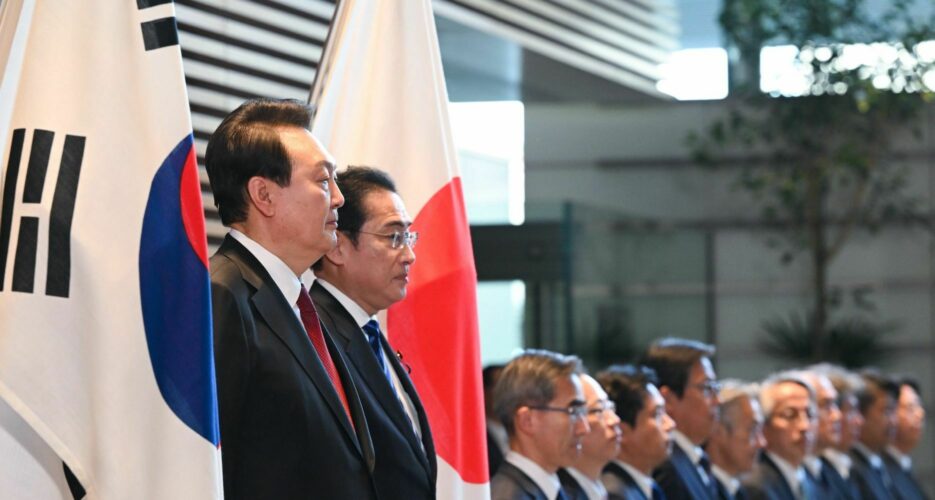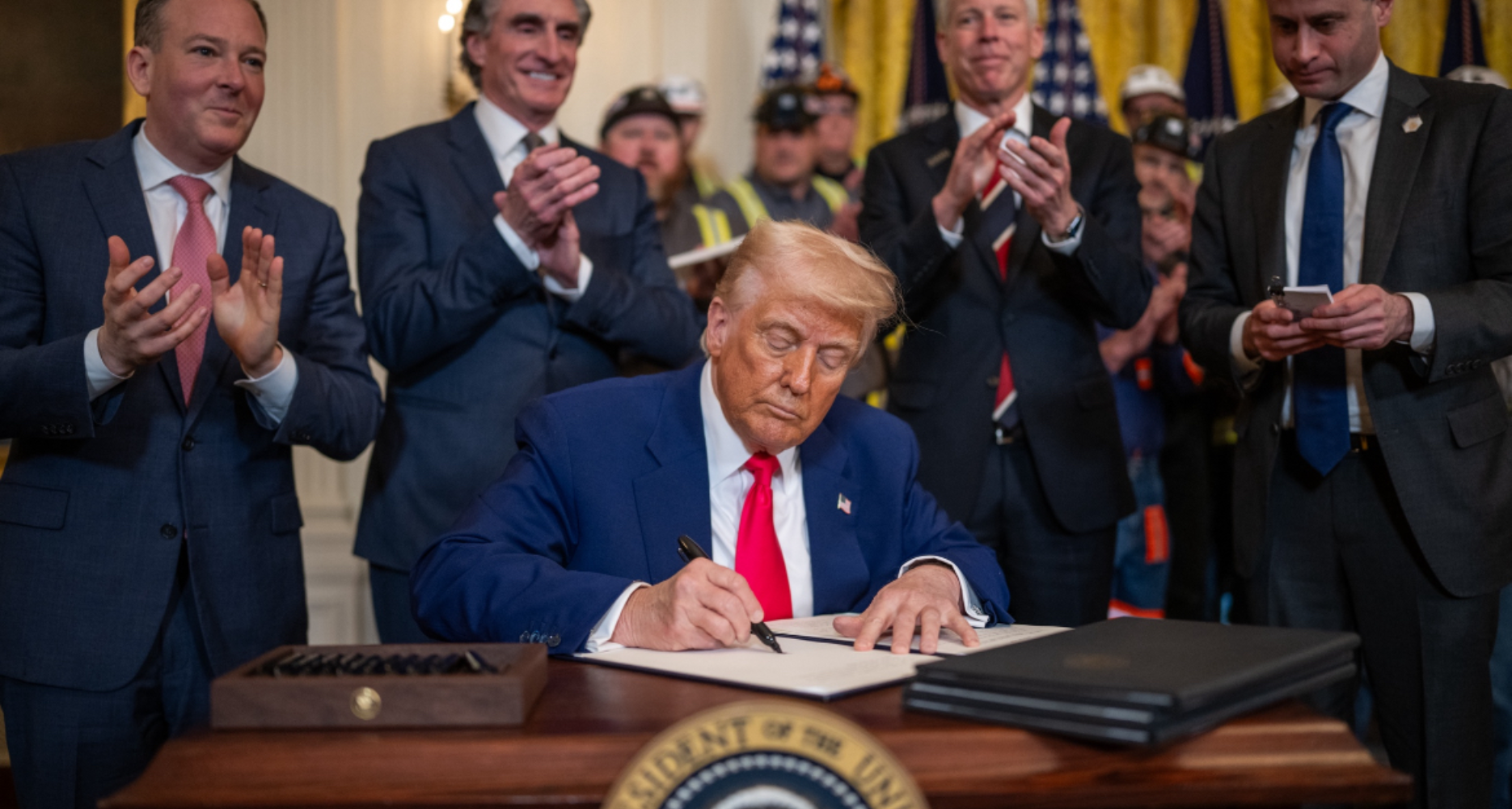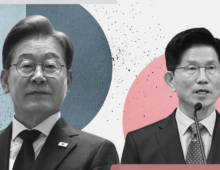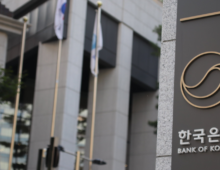Japan’s decision to lift export curbs could benefit ROK chip firms, but Yoon faces opposition to his outreach to Tokyo
Diplomatic relations between South Korea and Japan have thawed rapidly since the Yoon Suk-yeol administration announced its unilateral plan to compensate Korean victims of Japanese forced labor programs, leading to the first bilateral summit in more than 11 years.
During a joint press conference after their meeting on Thursday, South Korean President Yoon and Japanese Prime Minister Fumio Kishida made two significant announcements. First, Japan will lift the export restrictions that it had imposed on South Korea since 2019. Second, the two countries will normalize the General Security of Military Intelligence Act (GSOMIA), a military intelligence-sharing pact.
The two announcements signal an opportunity for South Korean corporations to stabilize their supply chains and for Seoul to defend itself from North Korea’s nuclear and missile threats more effectively. However, much of this progress will depend on Yoon’s ability to convince South Korean voters that his decision to improve Seoul’s ties with Tokyo — as heavily criticized as it was by victims, activists and opposition parties — was the right call.
IMPROVED SEMICONDUCTOR PRODUCTION YIELDS
South Korea’s economy has logged record trade deficits over the past 12 months, as exports of computer chips and other high-tech items sank amid a global economic slowdown.
According to Korea International Trade Association (KITA) — an umbrella economic organization representing South Korea’s international trade community — semiconductor exports decreased by 44.5%, accounting for over half of the decrease in total exports.
However, not all semiconductor manufacturers are suffering. While Samsung Electronics recorded a $2.3 billion loss from its memory chip business in the first two months of the year, Taiwan Semiconductor Manufacturing Company (TSMC) logged a $9.7 billion profit in the final quarter of 2022.
One of the reasons Samsung Electronics has lost market share to its Taiwanese rival has to do with production yield issues. Semiconductor yields refer to the percentage of the total number of chips that were produced to the maximum chip count on one wafer — the key material used to create semiconductor integrated circuits.
Samsung Electronics lost a deal to manufacture Qualcomm’s Snapdragon 8 chips to TSMC last year due to its yield issues. While Samsung announced a plan in 2021 to invest $151 billion in the logic chip and foundry sectors by 2030, the company’s 4nm process node had a yield rate of as low as 35% as of last year, while TSMC’s 4nm process node reportedly had a yield rate of over 70%.
The Japanese government’s decision to lift its export restrictions on South Korea might help ROK semiconductor manufacturers improve their production yields. Japan’s restrictions severely limited the export of three critical materials necessary for manufacturing semiconductors — hydrogen fluoride, fluorinated polyimide and photoresist.
Japan produces about 90% of fluorinated polyimide and photoresist and about 70% of hydrogen fluoride in the global market.
In response to the export restrictions, ROK semiconductor manufacturers expanded localization efforts to secure the materials they imported from Japanese manufacturers. Despite the insistence that South Korean companies secured local supply chains, Tokyo’s decision to impose its restrictions regime must have hurt.
For instance, semiconductor manufacturers use pure hydrogen fluoride to remove excess material from around circuit patterns on silicon wafers. Industry experts say that the quality of materials matter because “semiconductor production yield rates are higher when using high-quality materials from Japanese companies.”
South Korean companies, such as Samsung Electronics and SK Hynix, could thus reclaim the market share they lost in the past several years by regaining access to critical Japanese materials.
SHARING MILITARY INTELLIGENCE
Critics of Yoon’s diplomacy with Tokyo, such as main opposition Democratic Party (DP) leader Lee Jae-myung, have argued that normalizing GSOMIA is a concession and a humiliation.
But while GSOMIA might be the only security agreement between Seoul and Tokyo, the deal is not a comprehensive pact.
The agreement does not obligate either of the two countries to share military intelligence. Instead, it obligates both countries to use their respective domestic laws to protect the military intelligence they provide each other. Any intelligence that they share is based on each side’s determinations and needs.
GSOMIA’s value lies in its symbolism, as it allows South Korea and Japan to strengthen their respective defense agreements with the U.S. Washington seeks to strengthen its trilateral partnership with its Asian allies to contain North Korea and China and wants to use GSOMIA as a bedrock to preserve the security bloc in the region. For this reason, U.S. officials delivered a rare and public rebuke of South Korea when the Moon administration threatened to withdraw from the pact.
The decision to normalize the pact thus does not guarantee any actual sharing of military intelligence but signals that the three countries will boost cooperation.
Mason Richey, an associate professor of international politics at Hankuk University of Foreign Studies, suggests that there could be additional benefits to normalizing GSOMIA.
“Currently, South Korea and Japan share information via the U.S., using an authority referred to as Trilateral Intelligence Sharing Agreement (TISA),” Richey told Korea Pro. “With the normalization of GSOMIA, it will become the legal framework for South Korea and Japan to share military information.”
“In the long term, GSOMIA would be critical as a legal foundation for the type of automatic information sharing necessary for linking Japanese and South Korean missile defense sensor assets useful for tracking North Korean missiles,” Richey added.
POTENTIAL PITFALLS
During their joint press conference, Yoon said he has no plans to seek reimbursement from Japan to compensate forced labor victims.
“If we exercise the right to indemnity, all of the problems will return to where they were,” Yoon said in answer to a reporter’s question.
But his decision will gain him no favors among voters. The DP described Yoon’s summit with Kishida as “the culmination of submissive diplomacy” and “a shame on the people.”
A poll conducted by Sisa Research found that 60% of South Koreans oppose the deal, and a RealMeter survey similarly put the level of opposition at 58%. A Gallup Korea poll showed that Yoon’s approval rating dropped to 33%, and the most cited reason people gave for disapproving was the forced labor compensation issue.
Beijing has paid attention, too. When asked about the summit, Chinese foreign ministry spokesperson Wang Wenbin replied, “We oppose certain countries’ attempts to form exclusionary cliques and hope Japan-ROK ties will move forward in a way conducive to regional peace, stability and prosperity.”
The Japanese government reciprocated Yoon’s overtures by lifting its export restrictions. Now, Yoon has to convince ROK voters that he made the right call. If he fails, all the problems that have plagued ROK-Japan relations will not just return to where they were but could worsen.
Edited by Bryan Betts













